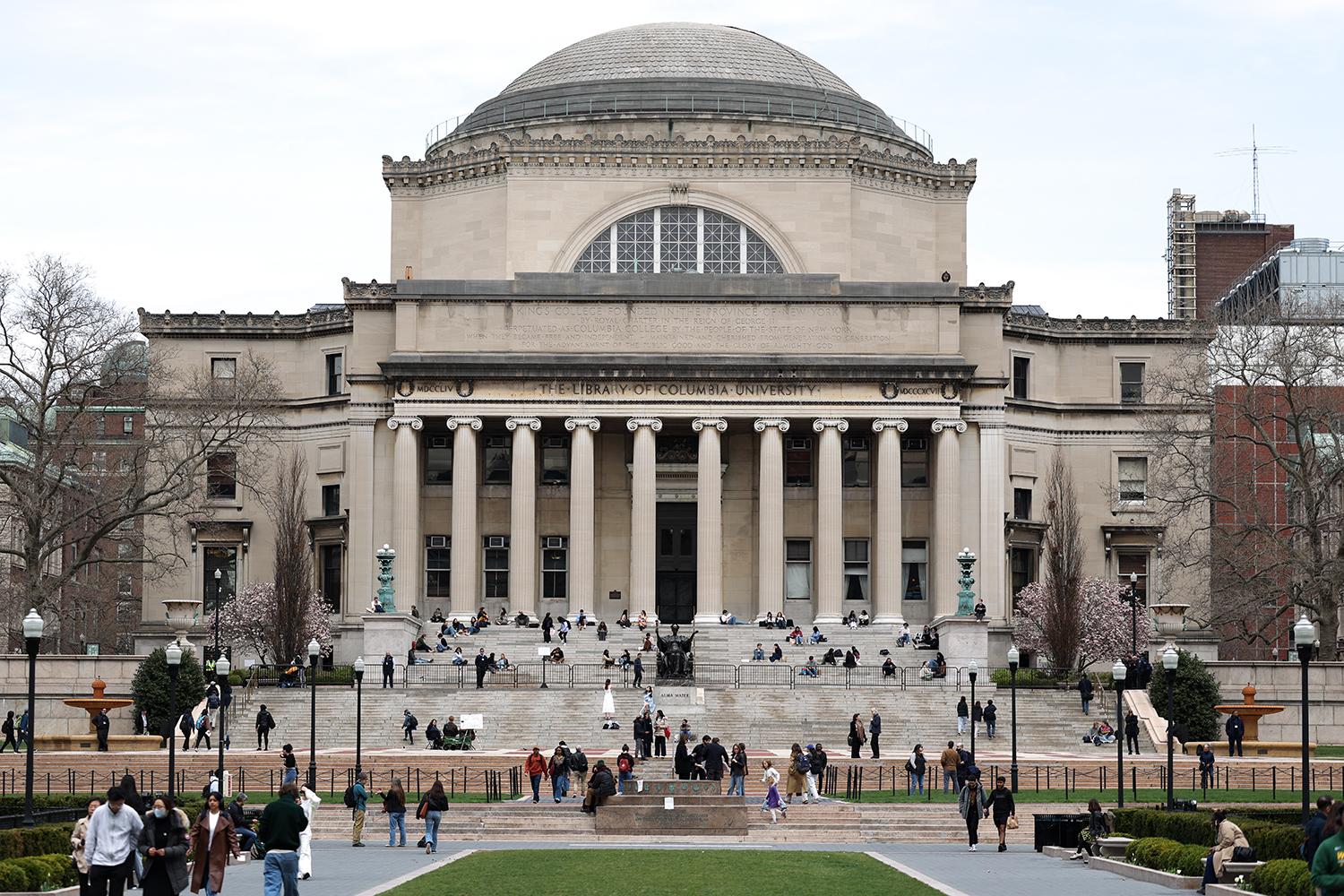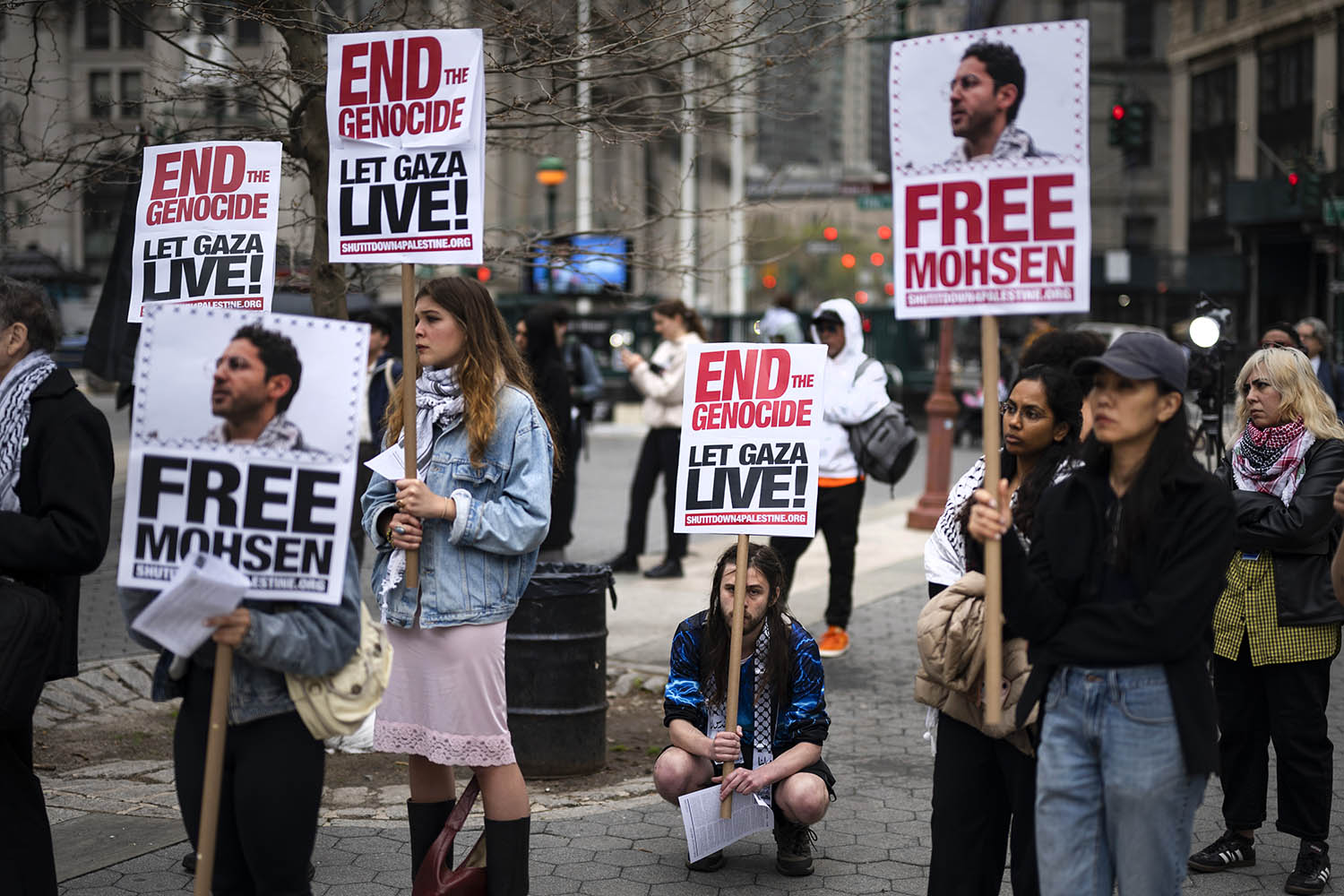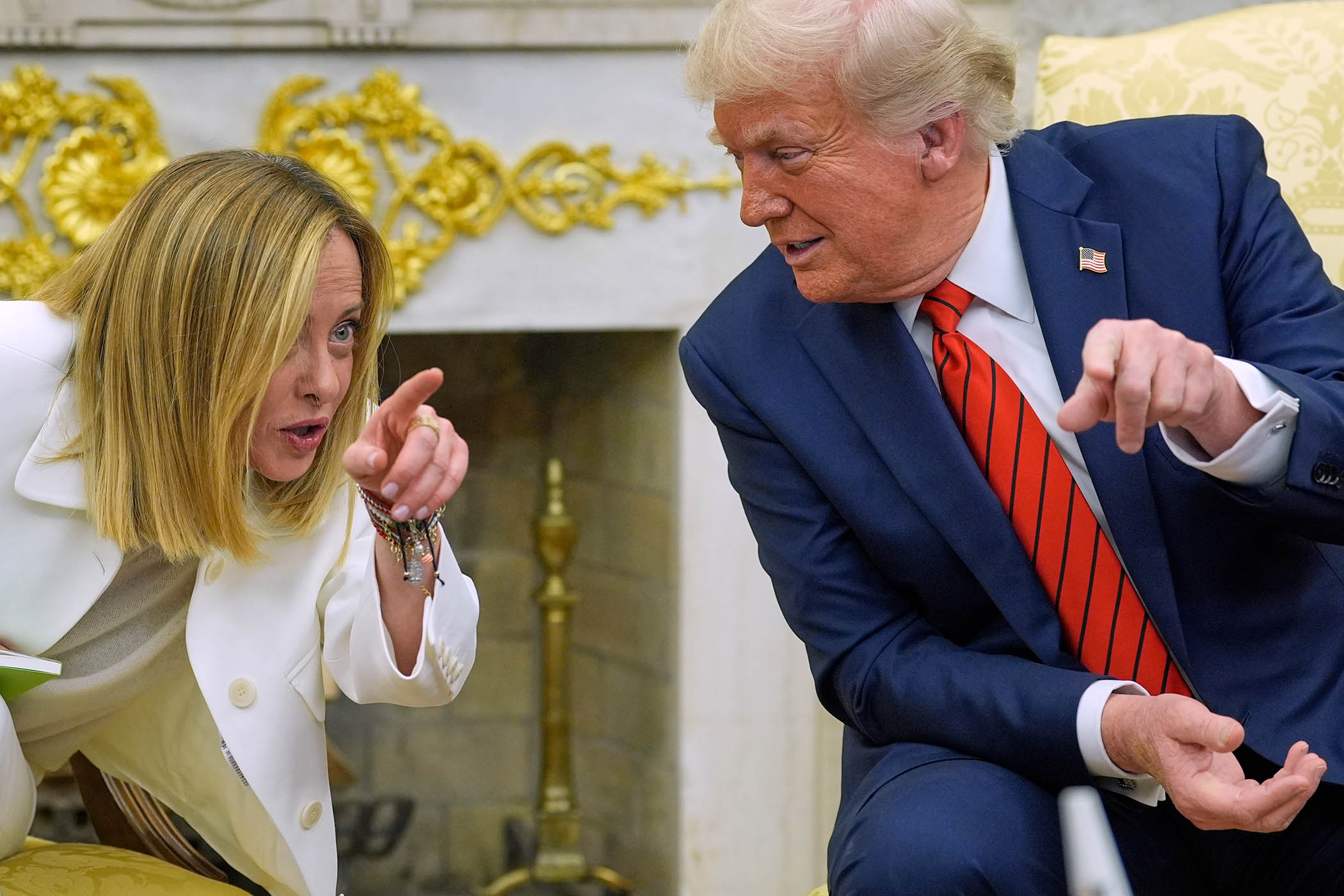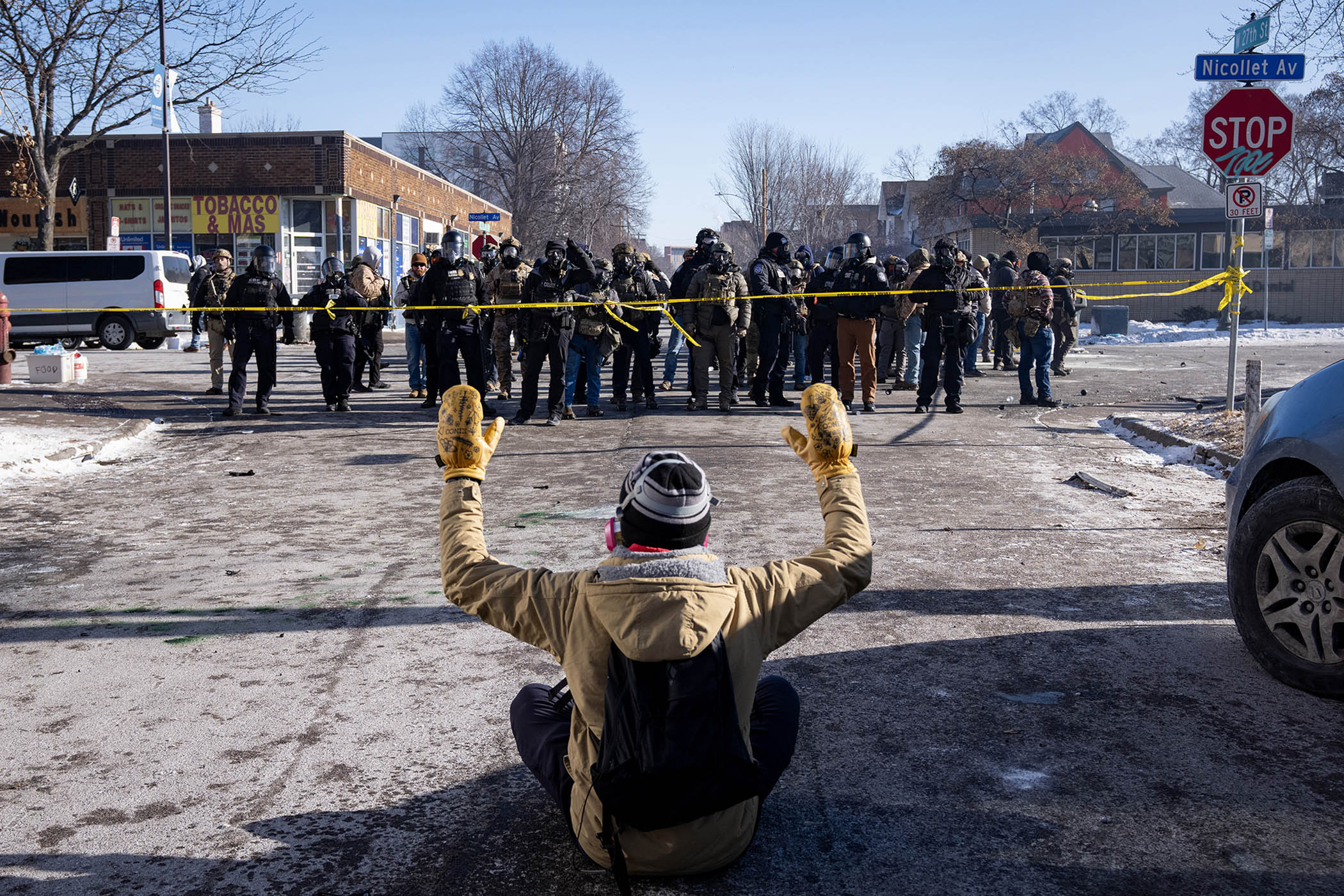When the Trump administration first sought to eviscerate Columbia University’s funding and independence – the opening salvo of what has quickly metastasised into a wider war against higher education in the United States – nobody at the august New York institution could say it came entirely as a surprise.
Months before Trump was elected to a second White House term last in November, Republicans in Congress were accusing elite colleges, including Columbia, of tolerating rampant antisemitism among students protesting against Israel’s war in Gaza, and they threatened a “fundamental reassessment of federal support” – everything from cancelling medical research dollars to lifting their tax-exempt status – if this did not change.
The incoming vice president, JD Vance, was on record, saying: “We have to honestly and aggressively attack the universities in this country” – seeing them as liberal Democratic strongholds that needed storming. And, in December, Max Eden from the American Enterprise Institute flat-out recommended that the new administration “destroy Columbia University” – a “prize scalp”, Eden said, “to scare universities straight”.
Yet when the moment of reckoning came – a threat last month to cancel $400m in federal grant funding if Columbia did not accede to demands including putting its prized, if occasionally controversial Middle Eastern, South Asia and African Studies department under extraordinary supervision – the university made no attempt to fight back.
It didn’t even complain about Trump’s immigration enforcers, who had begun targeting its international students – some but not all involved in the campus protests – by stripping them of their visas and their student status and either hauling them into detention or declaring them to have “self-deported” – that is, fled the country before they could be arrested.
Instead, the university trumpeted its concessions – mostly on campus security and cracking down on students’ right to protest – as things it was largely planning to do anyway. “These changes are real,” the interim president, Katrina Armstrong, insisted on 25 March, “and they are right for Columbia.”
Three days later, Armstrong was no longer president, the apparent victim of a leak indicating she had quite different views in private, and the campus on Manhattan’s Upper West Side was in turmoil, a roiling, unhappy mess of mistrust and mutual recrimination.
Some accused the university of capitulation. Others described its actions as collusion or even collaboration, seeing a confluence of interests from Washington to pro-Israeli faculty to members of the university board of trustees who didn’t like Columbia’s long history of multifaceted scholarship on Israel and Palestine, or the student encampments and sit-ins, and were quite happy to see them all reined in and disciplined.
Related articles:
When Harvard, facing a much broader list of demands from the Trump administration, refused to buckle and filed a lawsuit instead, and when Princeton’s president indicated his own intention to stand fast, it only served to sharpen criticism of Columbia and its motives – casting the institution as the most compromised of America’s Ivy League colleges at a uniquely challenging time.
“Some part of our university has enlisted the federal government to try to recreate our institution in line with their own ideological priorities, specifically the way we teach the history and culture of the Middle East,” said Joseph Howley, a classics professor who has championed the campus protests against Israel’s war in Gaza and spoken out vigorously against the administration’s responses to them.
Newsletters
Choose the newsletters you want to receive
View more
For information about how The Observer protects your data, read our Privacy Policy
If cosying up to the administration was part of Columbia’s game plan, though, it did not work. The Trump administration failed to restore the $400m, insisting on more negotiation first, and made a further threat to place Columbia under a judicial consent decree that would curtail its independence.
The day after Harvard rejected Trump’s onerous terms, Columbia’s new interim president, Claire Shipman, at last laid down a line in the sand, saying she would reject “heavy-handed orchestration from the government that could potentially damage our institution”.
Yet she did not appear to backtrack on any previous concessions and failed to silence critics who feared she was interested only in restoring the grant money, even at the expense of the free-speech rights of Columbia’s faculty and students.

The Low Library at Columbia University, which is in Trump’s firing line over student protests. Photograph: AFP/Getty
A university spokesperson did not respond to this criticism directly, but said: “We appreciate the ongoing dialogue with our regulators, and their willingness to engage with Columbia constructively.”
Jameel Jaffer, who runs the Knight First Amendment Institute at Columbia, said he found it “remarkable and shocking” that universities – not just Columbia – were not suing the government over the arrest of international students, among other ways of fighting back. “They would have a very good chance of winning that lawsuit, and it would foreclose the administration from arresting students on the basis of their political viewpoints,” he argued.
Instead, Columbia and many other campus leaders have largely acquiesced in the face of the narrative promoted by Trump that antisemitism is a major problem at American universities and that the marches and encampments to protest Israel’s war are symptoms of it. That, in turn, has infuriated the subsection of Columbia’s Jewish students and faculty who are appalled by what they regard as Israeli war crimes and have themselves been active in the protests. They do not dispute that controversies over Gaza have led to ugly language and threatening behaviour directed at Jewish students, but they say that is far from the prevailing mood on a campus that is about one sixth Jewish.
They also say that the two most prominent Palestinian students arrested as a result of their campus activism, Mahmoud Khalil and Mohsen Mahdawi, were both champions of dialogue, not division, and known to the university leadership for it.
“I was at the encampments every day and I never saw anything antisemitic there,” said Caitlin Liss, a doctoral student in history, who kept kosher for Passover on the lawn outside Columbia’s Butler Library last year with the full support of her fellow protesters. “They are equating anti-Zionism with antisemitism. It’s very misleading."
Columbia has played host to proxy battles over the Middle East for decades, its fault lines defined on the one hand by prominent Palestinian-American academics like Edward Said and Rashid Khalidi who greatly enhanced the university’s international reputation and, on the other, by a robust array of fervently pro-Israeli donors, alumni, faculty members and trustees who disapproved of their scholarship and worried that Columbia was turning into “Bir Zeit-on-Hudson”.
‘What they are doing is destroying higher education withthe veneer of goingafter antisemitism’
‘What they are doing is destroying higher education withthe veneer of goingafter antisemitism’
Caitlin Liss, student
Around the turn of this century, activist pro-Israeli groups started encouraging students to take notes on Middle East studies professors they suspected of anti-Israeli bias, culminating in a notorious 2004 documentary that led to an extensive university investigation but no findings that any professor had made antisemitic statements or punished students with dissenting views.
The principal target of the film, Joseph Massad, a professor of modern Arab politics and intellectual history, has been a lightning rod ever since. Massad certainly did Columbia’s public image no favours when, in the immediate aftermath of Hamas’s slaughter of hundreds of Israeli civilians on 7 October 2023, he characterised the attacks as “awesome” and “a victory for the resistance”.
Divisions on campus grew rapidly after the Hamas attacks. Many Jewish students and faculty complained that they received no sympathy, only criticism for their support of an Israeli government that was bombing hospitals and killing children. Some complained that they no longer felt safe wearing the star of David around their necks, and others that they didn’t like to reveal they were Jewish at all.
Pro-Palestinian protesters, meanwhile, had to fend off accusations of antisemitism from the get-go. At a rally and “die-in” in November 2023, a number of them, including Mahdawi, confronted an outside provocateur who approached, shouting “death to Jews”. The crowd booed and shouted “shame on you”, and the man was eventually escorted away by the police.
This version of events was written up in the campus newspaper and has not been disputed. Yet, the next day, the university administration suspended two student groups behind the demonstration, Students for Justice in Palestine and Jewish Voice for Peace, saying they had staged “an unauthorised event” that “included threatening rhetoric and intimidation”.
The groups were outraged to have been suspended and outraged, too, that the university appeared to be blaming them for “threatening rhetoric” they had done everything in their power to stop. (The administrator who signed the announcement later walked back this wording in a meeting with faculty leaders, but never withdrew it more publicly.)
Fast-forward to this month, and the justification the State Department offered for taking Mahdawi into custody followed the same form of words – that he had “engaged in threatening rhetoric and intimidation of pro-Israeli bystanders”.
“Suspending the student groups was the first concrete moment of repression. And now we see the direct word-for-word echo,” said Howley, the classics professor. “It’s irresponsible and dangerous to talk about students in an inaccurate way.”
At the time, part of the university leadership was determined to play it straight, hoping to hold a fractious campus together in the knowledge that the Republicans would exploit every weakness. But the pro- and anti-Israeli factions dug in only deeper, leading to an escalation in vandalism, verbal assaults, building occupations and police interventions. One Israeli professor in the business school, Shai Davidai, was so relentless in hounding university staff and hurling insults at his adversaries that he ended up banned from campus. More recently, 22 pro-Palestinian protesters were suspended or expelled.
And the leadership itself has been riven with competing interests. According to two well-informed sources, members of the board of trustees were in direct communication with Republicans in Congress and, later, the Trump administration, offering information and advice on what demands to make and how to present them. A number of faculty members and students, the sources said, have been doing much the same thing. The State Department’s justification for arresting Mahdawi is one of a few examples where a government document ended up closely resembling ideas that originated at Columbia.
One senior administrator, who did not wish to be named, blamed both sides for allowing their passions about the Middle East to sap the university’s ability to stand up to the Trump onslaught. “Whether it was faculty or students or board members who were pursuing their own political agendas,” the administrator said, “they just didn’t care about tarnishing Columbia’s reputation… and it gave Trump so much ammunition. That is the most heartbreaking thing about this whole story.”
The Columbia campus today is a diminished and demoralised place, ringed by security gates and patrolled by large numbers of uniformed police. Professors and students talk about the fear they experience in class, either because a student is reporting to an outside watchdog such as Canary Mission or Accuracy in Media, or they worry someone might. International students tend to say little, if they come to class at all. One long-time humanities professor said she and her colleagues were regularly subjected to doxxing, hate mail and death threats. At the sight of a camera pointed in her direction, she turned around and encouraged others to do the same, for fear that the pictures would end up on some website and lead to further harassment. She did not want to be named for similar reasons.
Columbia is known for its core curriculum: a reading list of classic texts that all students, regardless of discipline, are required to study. But Liss, the doctoral student, said the rancid political environment was interfering with teaching of at least one book, Frantz Fanon’s anti-colonialist treatise The Wretched of the Earth, which raises issues of race and power that Trump and his supporters have denounced as leftwing lunacy.
“All of a sudden, people feel they can’t have a conversation about it, and it makes them anxious,” Liss said. “There’s just this general paranoia – who knows what someone is doing in class. It’s not a way to learn.”
Main photograph: Mostafa Bassim/Anadolu via Getty Images



